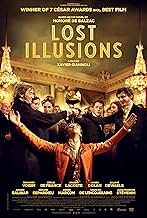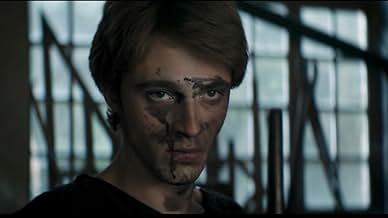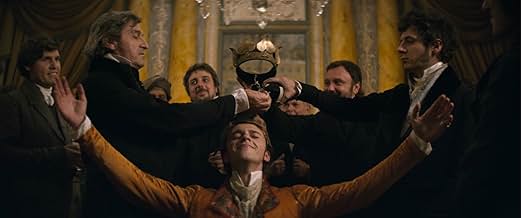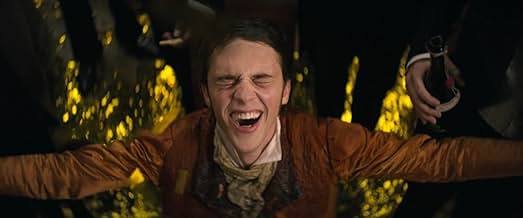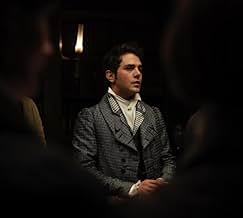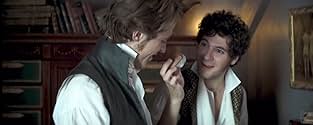VALUTAZIONE IMDb
7,4/10
7221
LA TUA VALUTAZIONE
Un adattamento del romanzo di Honoré de Balzac: Illusioni perdute.Un adattamento del romanzo di Honoré de Balzac: Illusioni perdute.Un adattamento del romanzo di Honoré de Balzac: Illusioni perdute.
- Regia
- Sceneggiatura
- Star
- Premi
- 8 vittorie e 19 candidature totali
Recensioni in evidenza
Lost illusions is for many critics, the best Balzac's novel and the adaptation that Xavier Giannoli (the director) delivers is not only fairly pleasant, dynamic and very well interpreted, it also has a special resonance in our world controled by social networks, search for buzz, influencers, fake news and a few rich media owners.
However, the story seems quite far from our world as it takes place in the first part of the 19th century (around 1820-1830) during the period of "Restauration", when monarchy came back to power in France but also when the liberals were pushing for changing the regime or at least experimenting new liberties such as parliamentarism and freedom of the press.
Lucien de Rubempré is this young man full of dreams who comes from the French country side eager to live from his literary talents, driven by his forbidden love to a rich aristocrat . Sent away to Paris, little by little Lucien will lose his illusions to discover a world full of greed, machiavellianism and dishonesty.
Xavier Giannoli tackles lots of topics in what we understand is a very rich novel. One of the topic is the transformation of literature into merchandise. The depiction of the book publishers is machiavellian. The depiction of a new kind of journalism based on sensacional news is quite shocking. In fact, Xavier Giannoli doesn't make a plea for journalists, on the contrary, he even tries to discredit them and presents them as filthy people, greedy for money. It's sometimes a little bit too much but we understand that the new liberties conceded by the government back in those days have a repercussion on different fields of the society and we also understand it concerns a certain type of journalism and not all journalisms. However the resonence in our 21st century world is quite obvious concerning the search of buzz.
We clearly understand that what the director wants to make us some winks thoughout his film, winks that the attentive spectator cannot miss. There is notably the explanation of how the buzz is created among the press, but also how the media (for the time, mainly newspapers) are controlled and owned by rich entrepreneurs or by the big bosses of advertising agencies and how these influencers of the 19th century try to invade the parliament and get the hold of the main positions among the government. The sentence "there will be a time a bankier will be president of the republic" is clearly a wink to our French president Macron, former banker himself.
All in all, Xavier Giannoli makes a great adaptation, with a lot of characters and a fine depiction and understanding of the changes that were at stake back in the 19th century and that have a special resonance nowadays.
However, the story seems quite far from our world as it takes place in the first part of the 19th century (around 1820-1830) during the period of "Restauration", when monarchy came back to power in France but also when the liberals were pushing for changing the regime or at least experimenting new liberties such as parliamentarism and freedom of the press.
Lucien de Rubempré is this young man full of dreams who comes from the French country side eager to live from his literary talents, driven by his forbidden love to a rich aristocrat . Sent away to Paris, little by little Lucien will lose his illusions to discover a world full of greed, machiavellianism and dishonesty.
Xavier Giannoli tackles lots of topics in what we understand is a very rich novel. One of the topic is the transformation of literature into merchandise. The depiction of the book publishers is machiavellian. The depiction of a new kind of journalism based on sensacional news is quite shocking. In fact, Xavier Giannoli doesn't make a plea for journalists, on the contrary, he even tries to discredit them and presents them as filthy people, greedy for money. It's sometimes a little bit too much but we understand that the new liberties conceded by the government back in those days have a repercussion on different fields of the society and we also understand it concerns a certain type of journalism and not all journalisms. However the resonence in our 21st century world is quite obvious concerning the search of buzz.
We clearly understand that what the director wants to make us some winks thoughout his film, winks that the attentive spectator cannot miss. There is notably the explanation of how the buzz is created among the press, but also how the media (for the time, mainly newspapers) are controlled and owned by rich entrepreneurs or by the big bosses of advertising agencies and how these influencers of the 19th century try to invade the parliament and get the hold of the main positions among the government. The sentence "there will be a time a bankier will be president of the republic" is clearly a wink to our French president Macron, former banker himself.
All in all, Xavier Giannoli makes a great adaptation, with a lot of characters and a fine depiction and understanding of the changes that were at stake back in the 19th century and that have a special resonance nowadays.
I'm not against the use of a narrator in a movie by principle. Narration can be useful to set context, or, even better, have an interesting dialogue with the action. However, I struggle to understand what the writers of this movie were thinking when they decided that every beat of this story needed narration. I felt like I was reading a picture book. It really diminished my enjoyment of the movie. Too bad, because it's a good story, served by excellent actors (I particularly loved Salomé Dewaels) and beautiful costumes and sets. A lot of the narration could have been cut by being more creative with the script and telling us things in different ways, or by simply leaving a few things unsaid and trusting the audience to cope with some ambiguity.
I'm frankly baffled by the fact that it won the "best movie" and "best adapted scenario" César awards (admittedly, I haven't seen its competition).
Also, the little nods to our present time, mostly done by that same narration, were very unsubtle. In a better film, I might have funnier, but there they tended to annoy me.
I'm frankly baffled by the fact that it won the "best movie" and "best adapted scenario" César awards (admittedly, I haven't seen its competition).
Also, the little nods to our present time, mostly done by that same narration, were very unsubtle. In a better film, I might have funnier, but there they tended to annoy me.
It's a 600 page novel that had to be boiled down to fit the running time of 2 1/2 hours, some minor characters had to be thrown out. The third part of the book is dispensed with--no great loss.
We are left with a wonderful satire of the popular press in France circa 1830. Graft and bribery are part of the game, and our hero Lucien is never quite sure where the next knife is going to come from that will enter his back. My favourite character is Sarfati, the claque leader, whose mob can be bought for whomever pays top dollar. The acting is superb, as you might imagine: Depardieu, de France, de Lenquesaing all acquit themselves well, and Vincent Lacoste as Lucien's changeable buddy Lousteau is marvellous. Only Benjamin Voisin doesn't quite meet the demands of the role, and he's in almost every scene. Sets and costumes are very good, and Giannoli's direction is assured.
We are left with a wonderful satire of the popular press in France circa 1830. Graft and bribery are part of the game, and our hero Lucien is never quite sure where the next knife is going to come from that will enter his back. My favourite character is Sarfati, the claque leader, whose mob can be bought for whomever pays top dollar. The acting is superb, as you might imagine: Depardieu, de France, de Lenquesaing all acquit themselves well, and Vincent Lacoste as Lucien's changeable buddy Lousteau is marvellous. Only Benjamin Voisin doesn't quite meet the demands of the role, and he's in almost every scene. Sets and costumes are very good, and Giannoli's direction is assured.
After a long hiatus since the pandemic, I made a return to the cinema notably to catch up with #lefrenchfilmfestival. Most of the films I would say struggled to justify your time in the cinema indulging in such frivolity but this one particularly stood out.
I am not familiar with and have never read Balzac but I reckon this film gives you a glimpse of his genius and why he remains a giant in French literary circle, not merely for prose or poetry but for his devastatingly incisive social commentary still relevant today.
And one couldn't help but feel despite our technological advancements and having totally plundered the planet, from a moral standpoint the world hasn't progressed not even an inch today and remains mercilessly mercenary under a veneer of righteousness as Balzac had so accurately depicted some two centuries ago.
Dazzlingly executed with a superb ensemble of cast, illuminating performances, a production nothing short of breathtaking and lashings of Baroque including the less often heard Jean-Philippe Rameau, the film remains and stays with you long after you have left the cinema.
I am not familiar with and have never read Balzac but I reckon this film gives you a glimpse of his genius and why he remains a giant in French literary circle, not merely for prose or poetry but for his devastatingly incisive social commentary still relevant today.
And one couldn't help but feel despite our technological advancements and having totally plundered the planet, from a moral standpoint the world hasn't progressed not even an inch today and remains mercilessly mercenary under a veneer of righteousness as Balzac had so accurately depicted some two centuries ago.
Dazzlingly executed with a superb ensemble of cast, illuminating performances, a production nothing short of breathtaking and lashings of Baroque including the less often heard Jean-Philippe Rameau, the film remains and stays with you long after you have left the cinema.
It's very rare to be able to watch a 2h long literature movie without getting bored at any point.
Great cast, great adaptation of dialogues that make it a modern adaptation of Balzac while still translating the soul of it.
Great cast, great adaptation of dialogues that make it a modern adaptation of Balzac while still translating the soul of it.
Lo sapevi?
- QuizThe character of Nathan d'Anastazio, played by Xavier Dolan, is actually a synthesis of three characters from the novel: Raoul Nathan, a scheming journalist, Daniel d'Arthez, a hard-working writer and Melchior de Canalis, a successful poet.
- BlooperThe Dejazet theater is mentioned, but the movie takes place in the early 1800s, during the Restoration, and this theater was inaugurated on September 27th, 1859.
- Colonne sonoreConcerto in A Minor, BWV 1065: I. Allegro
Composed by Johann Sebastian Bach
Performed by Ensemble Bruno Rigutto, Gabriel Tacchino, Jean-Philippe Collard, Jean-Pierre Wallez, Michel Beroff & Paris Orchestral
I più visti
Accedi per valutare e creare un elenco di titoli salvati per ottenere consigli personalizzati
- How long is Lost Illusions?Powered by Alexa
Dettagli
- Data di uscita
- Paesi di origine
- Sito ufficiale
- Lingua
- Celebre anche come
- Lost Illusions
- Luoghi delle riprese
- Aziende produttrici
- Vedi altri crediti dell’azienda su IMDbPro
Botteghino
- Budget
- 18.700.000 € (previsto)
- Lordo Stati Uniti e Canada
- 126.391 USD
- Fine settimana di apertura Stati Uniti e Canada
- 15.182 USD
- 12 giu 2022
- Lordo in tutto il mondo
- 8.635.184 USD
- Tempo di esecuzione
- 2h 29min(149 min)
- Colore
- Proporzioni
- 2.41 : 1
Contribuisci a questa pagina
Suggerisci una modifica o aggiungi i contenuti mancanti




